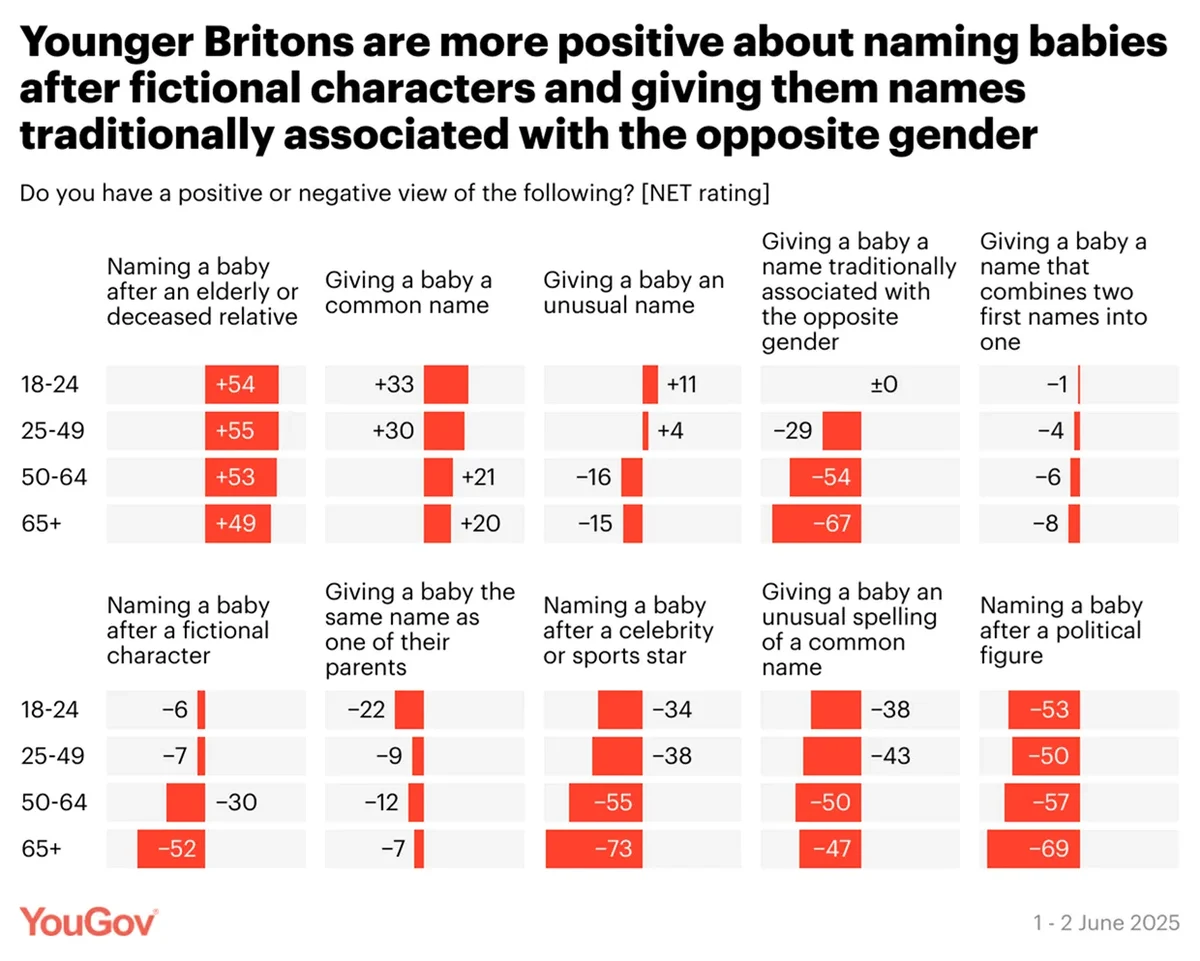Britons think an uncommon but not unusual name is the best way to go, but are strongly opposed to any formal restrictions on unusual names
What’s in a name? It is one of the first decisions new parents have to make upon the birth of their child and, in most cases, will stay with them for life as a central part of their identity. One of the key questions is how distinctive a name to pick – with benefits and drawbacks for both names that stick out and names which don’t.
For six in ten Britons (59%), the correct balance – if they were naming a baby today – is to go for a name which is ‘uncommon but not unusual’. This compares to 21% who say they’d prefer to give a child a ‘common’ name, while just 8% would opt for an ‘unusual’ name.
Attitudes do differ by how people see their own name. Among the 54% of Britons who believe they have a ‘common’ name, a third (32%) would prefer to give a child such a name, though this is less than the 50% who would opt for an ‘uncommon but not unusual’ name.
Similarly, the 8% of Britons who consider themselves to have an ‘unusual’ name are more likely to favour giving a child such a name, though again the 21% who would opt for this path is less than the 55% who think an ‘uncommon but not unusual’ name is the way to go.
And among those who say they themselves have an uncommon, but not unusual name, fully 77% would like for their child to have something similar.
Men are much more likely than women to think babies should be given ‘common’ names (30% vs 13%), though a preference for giving a baby an ‘uncommon but not unusual’ name is the norm among both groups (50% vs 67%).
How do Britons see ‘unusual’ names?
While just 8% of Britons would choose to give their baby an ‘unusual’ name, this doesn’t mean the rest see it as a bad thing to do. Indeed, 25% of Britons have an outright positive view of giving a baby such a name, while a further 44% hold neither a positive nor negative opinion of the practice.
Nonetheless, this does leave 30% of Britons who hold a negative opinion of giving a baby an ‘unusual’ name.
Perhaps key to this attitude is a belief that giving a baby such a name can create problems. A third of Britons (35%) think that an ‘unusual’ name typically has a negative effect on a child, with 26% believing negative effects persists to adulthood. This compares to just 9% believing it has a positive effect as a child and 12% feeling it confers benefits as an adult.
In both instances, though, the public tend to feel (46-51%) that an ‘unusual’ name does not have an overall positive or negative effect on that person.
However, those with an ‘unusual’ name aren’t fully in agreement. While they still tend to believe that such names overall have neither a positive nor negative effect on someone’s life (44-45%), 30% believe that an ‘unusual’ name has a positive effect on you as an adult, more than the 17% who feel it typically has a negative impact.
The unusually-named are, nonetheless, still more likely to think that having such a name has a negative than positive effect on you as a child (33% vs 15%).
How do Britons see sources of inspiration for names?
While only a minority of Britons see ‘unusual’ names as a negative, they are more resolutely against giving a baby an unusual spelling of a common name, with most Britons (55%) seeing this in a bad light.
Nearly six in ten Britons (57-58%) have a negative view of naming a baby after a celebrity, sports star or political figure, with just single digit proportions of the public (3-7%) seeing either as a positive thing, leaving a third (34%) with a more neutral view.
One type of baby naming that the public are fond of is naming a baby after an elderly or deceased relative, which six in ten Britons (59%) see as a positive thing to do, alongside a third (34%) who feel neither positively nor negatively about it.
Naming a baby after one of the parents, though, is a bit more divisive, with 35% seeing this negatively, 25% seeing it positively and 38% seeing it neither way.
In some cases, attitudes change between generations. Seven in ten over 65s (70%) see giving a baby a name traditionally associated with the opposite gender as a negative thing, compared to just 26% of 18-24 year olds, an equal number of whom see it as an outright positive.
Younger Britons are also more open to babies being named for fictional characters, with just a third of 18-24 year olds (32%) seeing it is a negative practice, compared to 56% of over 65s.

Do Britons think that baby names should be regulated?
While Britons might think that some baby naming practices are a negative, there’s little appetite in introducing formal restrictions on baby names, as can be found in some other countries. At present, there are no explicit rules in the UK on baby names, but a Registering Officer can reject names in extreme cases, such as if they include obscenities.
Just 18% of Britons would support introducing rules that would explicitly prevent parents from giving babies unusual names, with 73% opposed.
Even stricter regulations where parents have to choose names from a set list, as is the case in Denmark (even if the list includes more than 15,000 names for boys alone), would have the support of only 7% of Britons. This is compared to 88% of Britons being opposed to such a prescriptive rule.
How do parents feel about their children’s names?
While three quarters of parents (75%) say that coming up with a name for their baby was an easy task, there are one in five (21%) who said that they found it at least fairly hard to name their sprog.
Additionally, three in ten parents (29%) say that they changed their minds upon ‘meeting’ their baby for the first time, after the name they initially had in mind no longer seemed to fit them.
Regardless of any difficulties or changes of mind, few parents feel they made a mistake, with 96% saying they have no regrets about the names given to any of their children.
Regardless of how difficult it was, for most Britons, the right decision was made. Six in ten (60%) say they either love or like their name, while a further 29% neither like nor dislike their birth name. Just 11% of Britons say they dislike or hate the name they were given as a baby.
And it seems it’s here that having an ‘unusual’ name has merits. A third of people who say they have an ‘unusual’ name (34%) say they love their birth name, compared to 21% of those with ‘uncommon, but not unusual’ names and 15% of those with a ‘common’ name.
There is, by contrast, little difference between these groups in the number who dislike or hate their name (9-12%).
A third of parents (34%) say they would be at least fairly upset if their child told them that they did not like their name, while nearly half (46%) say they would be upset if they then took action on that dislike and changed their name. On both questions, just one in five parents (19-21%) say they would not be at all upset.
Would you give a baby an unusual name? What do you think about names in general, and everything else? Have your say, join the YouGov panel, and get paid to share your thoughts. Sign up here.
Photo: Getty








